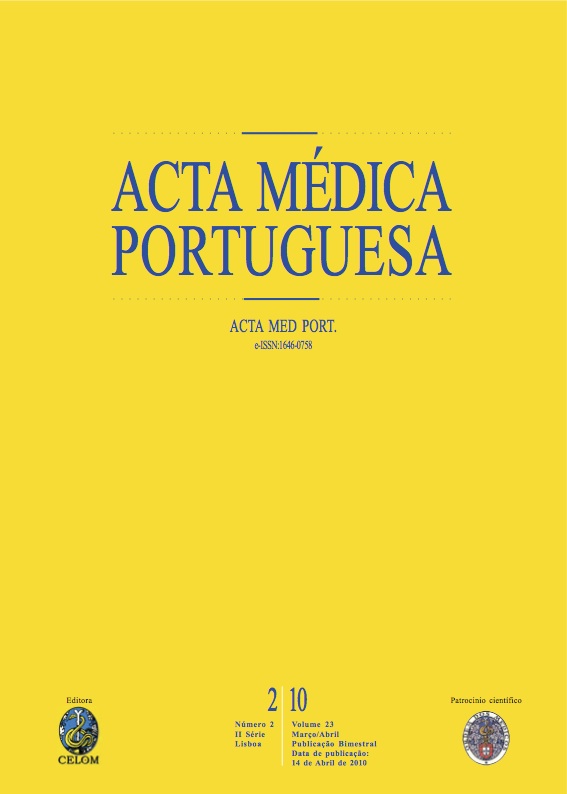Efectividade do rastreio, análise de conceitos e atitudes perante o síndrome metabólico: um estudo em doentes bipolares da consulta de psiquiatria do Hospital Santa Maria.
DOI:
https://doi.org/10.20344/amp.618Resumo
The Metabolic Syndrome (MS) is constituted by a set of specific metabolic alterations being postulated that the main dysfunction is insulin resistance, associated with abdominal type obesity, hypertension, hyperglycemia and dyslipidemia. Epidemiological data indicates prevalence of MS of about 25%. Estimates point to higher prevalence of MS in bipolar (BP) patients, between 30 to 35%. Cost-effective screening methods, not recurring to blood test, have been researched.Test the viability of MS screening without using blood tests. Analyse knowledge and importance given to the issue of MS in Bipolar patients.Observational, cross-sectional, exploratory study. Random sample of 15 BP patients, in euthymic phase, between 18 and 65 years. Semi-structured interview, YMRS, HAMD were applied. MS diagnosis was investigated according to the International Diabetes Federation (IDF), including blood tests. Screening of MS was defined positive if blood pressure > or = to 130/85 or on anti-hypertensive medication and Abdominal Perimeter > 90 cm in males or > 80 cm in females. Afterwards a questionnaire about knowledge, attitudes and concerns on MS was applied.14 patients completed the investigation protocol, 1 patient didn't do blood testing for unknown reasons. Five patients (36%) met IDF criteria for MS. Screening sensitivity was 80% and specificity 78% on our sample (1 false positive and 2 false negative). Twelve patients (80%) were overweight or obese. Mean IMC in patients that met IDF criteria for MS was 30 while in the other group mean IMC was 26, showing statistical significance. Only 3 (20%) have ever heard about MS, but the majority of the patients were concerned, in decreasing order, about weight gain, blood pressure cholesterol and hyperglycemia control.Although limited by small sample size, this study strengthens the idea that MS screening can be effective in clinical practice, it also indicates the need to educate BP patients about MS and to prevent overweight.Downloads
Downloads
Como Citar
Edição
Secção
Licença
Todos os artigos publicados na AMP são de acesso aberto e cumprem os requisitos das agências de financiamento ou instituições académicas. Relativamente à utilização por terceiros a AMP rege-se pelos termos da licença Creative Commons ‘Atribuição – Uso Não-Comercial – (CC-BY-NC)’.
É da responsabilidade do autor obter permissão para reproduzir figuras, tabelas, etc., de outras publicações. Após a aceitação de um artigo, os autores serão convidados a preencher uma “Declaração de Responsabilidade Autoral e Partilha de Direitos de Autor “(http://www.actamedicaportuguesa.com/info/AMP-NormasPublicacao.pdf) e a “Declaração de Potenciais Conflitos de Interesse” (http://www.icmje.org/conflicts-of-interest) do ICMJE. Será enviado um e-mail ao autor correspondente, confirmando a receção do manuscrito.
Após a publicação, os autores ficam autorizados a disponibilizar os seus artigos em repositórios das suas instituições de origem, desde que mencionem sempre onde foram publicados e de acordo com a licença Creative Commons









